Stogie Commentary: The Case Against Smoker Discrimination
16 Jan 2007
Yesterday the country honored Martin Luther King for his promotion of equality under the law and his dedication to ending racial discrimination. Thankfully, we have certainly made much progress towards those goals, in no small part because of King, since his assassination in 1968.
 But as Tampa Tribune editorial writer Joseph Brown noted in a recent column, while racial equality under the law has increasingly become a reality in the decades since King’s death, in the same period it has become acceptable to discriminate against another group:
But as Tampa Tribune editorial writer Joseph Brown noted in a recent column, while racial equality under the law has increasingly become a reality in the decades since King’s death, in the same period it has become acceptable to discriminate against another group:
Since King’s assassination nearly 40 years ago, however, one group of Americans has increasingly become a target for legal discrimination. They are barred from many public places – and even bleeding-heart liberals go along with it. Additionally, they are taxed unfairly.
The group: smokers.
Brown points out correctly what many smokers acutely notice regularly, that unlike almost any other segment of the population, discrimination – and particularly legal discrimination – is accepted against smokers where elsewhere it is condemned.
Meanwhile, in an article in the winter issue of Regulation Magazine, which is on the shelves now (unfortunately the article isn’t online, but an edited version is available on the Washington Post website), University of Missouri Law School Professor Thomas Lambert explores the reasons anti-tobacco activists give for that discrimination. Specifically, he looks at the most drastic anti-smoking measure – the smoking ban – and ultimately finds that these justifications just don’t cut it:
Contrary to ban advocates’ claims, the costs of smoking’s externalities are ultimately borne by the owners of smoking-allowed establishments who, as a group, have incentives to efficiently accommodate smokers and nonsmokers. Efforts to shape people’s preferences regarding smoking run into individual choice issues and may be counterproductive. Scientific evidence on the risk of ETS (“environmental tobacco smoke†– more commonly called second-hand smoke) may be overstated and never addresses the important point that some people are willing to take that risk.
A better approach would be a hands-off policy permitting business owners to set their own smoking policies. Motivated by the pursuit of profits, the owners would have the proper incentive to maximize social welfare. The market would be far more likely than government regulation to accommodate the various preferences of nonsmokers and smokers alike.
Lambert’s analysis is a bit dry and academic, but it is also thorough and quite convincing.
StogieGuys.com readers should take the time to read these articles. This way, the next time some anti-smoking zealot tries to tell you why your state or city should ban smoking, you’ll be ready to explain to them just how wrong they are.
Tags: cigars

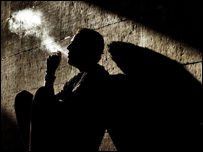 The absurdity of writing about cold weather cigar smoking from an 80 degree beach immediately made me think of one of my favorite (and similarly absurd) movie quotes:
The absurdity of writing about cold weather cigar smoking from an 80 degree beach immediately made me think of one of my favorite (and similarly absurd) movie quotes: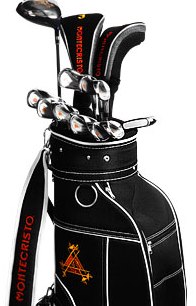
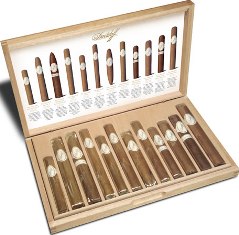

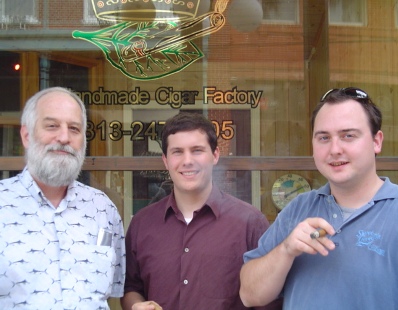
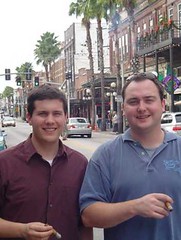 Later we found ourselves at King Corona Cigar, a large combination cigar shop, bar, and barbershop. They carry a respectable selection of name-brand cigars in a massive humidor. Tucked in between the CAO’s, Fuentes, and Diamond Crowns was an unbanded cigar simply called “Ybor City Handmades†that came in three sizes – Lonsdale, Torpedo, and Churchill.
Later we found ourselves at King Corona Cigar, a large combination cigar shop, bar, and barbershop. They carry a respectable selection of name-brand cigars in a massive humidor. Tucked in between the CAO’s, Fuentes, and Diamond Crowns was an unbanded cigar simply called “Ybor City Handmades†that came in three sizes – Lonsdale, Torpedo, and Churchill. My trip to Chicago not only provided me with opportunities to catch up with friends and loved ones. It also gave me a chance to visit a hometown treasure:
My trip to Chicago not only provided me with opportunities to catch up with friends and loved ones. It also gave me a chance to visit a hometown treasure:  The shop was established in 1976 under the guidance of Meyer Patur, a late cigar legend whose knowledge of the leaf and blending are rarely equaled. At 85 years old, the Russian-Jewish immigrant rolled 100 cigars each day on site.
The shop was established in 1976 under the guidance of Meyer Patur, a late cigar legend whose knowledge of the leaf and blending are rarely equaled. At 85 years old, the Russian-Jewish immigrant rolled 100 cigars each day on site. But if your travels don’t take you to Chicago, worry not. You can purchase cigars from Oakbrook Tobacco, including their renowned house blends,
But if your travels don’t take you to Chicago, worry not. You can purchase cigars from Oakbrook Tobacco, including their renowned house blends, 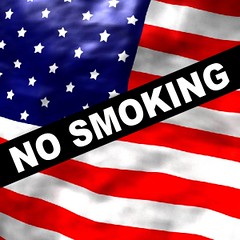 Name a group that’s been officially opposed to tobacco for decades. How about the
Name a group that’s been officially opposed to tobacco for decades. How about the 
 Patrick Ashby
Co-Founder & Editor in Chief
Patrick Ashby
Co-Founder & Editor in Chief Patrick Semmens
Co-Founder & Publisher
Patrick Semmens
Co-Founder & Publisher George Edmonson
Tampa Bureau Chief
George Edmonson
Tampa Bureau Chief